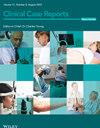罕见的Wolfram综合征表现为结核性脑膜炎1例报告。
IF 0.6
Q3 MEDICINE, GENERAL & INTERNAL
引用次数: 0
摘要
Wolfram综合征是一种极其罕见的疾病,由尿崩症、糖尿病、视神经萎缩和耳聋组成。当同时出现另一种疾病,如结核性脑膜炎时,所产生的广泛症状延误了诊断和治疗的确定,从而导致患者发病率增加。本文章由计算机程序翻译,如有差异,请以英文原文为准。

A Rare Case of Wolfram Syndrome Presenting With Tuberculous Meningitis: A Case Report
Wolfram syndrome is an extremely rare condition composed of a tetrad of diabetes insipidus, diabetes mellitus, optic atrophy, and deafness. When concurrently presenting with another condition, such as tuberculous meningitis, the widespread range of resulting symptoms delays the establishment of diagnosis and treatment, which results in increased patient morbidity.
求助全文
通过发布文献求助,成功后即可免费获取论文全文。
去求助
来源期刊

Clinical Case Reports
MEDICINE, GENERAL & INTERNAL-
自引率
14.30%
发文量
1268
审稿时长
13 weeks
期刊介绍:
Clinical Case Reports is different from other case report journals. Our aim is to directly improve global health and increase clinical understanding using case reports to convey important best practice information. We welcome case reports from all areas of Medicine, Nursing, Dentistry, and Veterinary Science and may include: -Any clinical case or procedure which illustrates an important best practice teaching message -Any clinical case or procedure which illustrates the appropriate use of an important clinical guideline or systematic review. As well as: -The management of novel or very uncommon diseases -A common disease presenting in an uncommon way -An uncommon disease masquerading as something more common -Cases which expand understanding of disease pathogenesis -Cases where the teaching point is based on an error -Cases which allow us to re-think established medical lore -Unreported adverse effects of interventions (drug, procedural, or other).
 求助内容:
求助内容: 应助结果提醒方式:
应助结果提醒方式:


